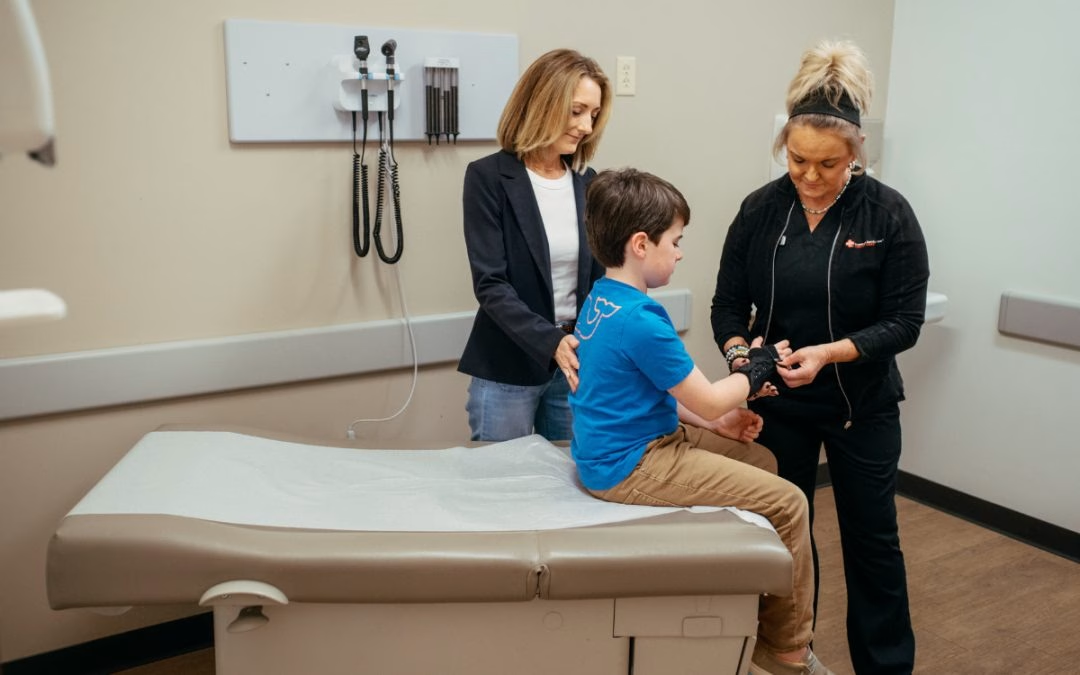
A sudden sore throat after a family outing at Fletcher Park or a sprained ankle from an enthusiastic game of tag at the playground can quickly turn a fun afternoon into a stressful situation. When illness or injury strikes unexpectedly, urgent care often becomes the next step. But for many children, visiting a medical clinic can bring up anxiety, fear, and discomfort, especially when they’re already feeling unwell. So how can you help your child feel less nervous about a trip to urgent care?
At AFC Cleveland, we understand that pediatric visits can be emotional for both kids and parents. Fortunately, with a little preparation and the right support, you can help ease your child’s anxiety and turn a potentially stressful situation into a more manageable experience.
Why Kids Feel Nervous About Urgent Care
Anxiety about medical visits is common in children, particularly when the visit is unplanned or to an unfamiliar location like an urgent care clinic. According to the American Academy of Pediatrics, children often fear medical visits for several reasons:
- Fear of pain or shots: Even the possibility of getting a vaccine or blood draw can make a child feel overwhelmed.
- Separation anxiety: Some children worry about being separated from their parent during the exam.
- Previous negative experiences: A past visit that included discomfort, fear, or long wait times may influence how they react to future visits.
- Unfamiliar environments: New sights, sounds, people, and procedures can all trigger general unease.
Because kids thrive on predictability and comfort, the unfamiliar nature of urgent care combined with feeling sick or hurt, can create a perfect storm for anxiety.
How to Prepare Your Child for an Urgent Care Visit
The good news is that there are several research-supported strategies that parents can use to help reduce a child’s anxiety before and during a medical visit. Preparation and communication are key.
1. Talk to Your Child Ahead of Time
If the visit isn’t an emergency, give your child a gentle heads-up. Explain why you’re going in age-appropriate terms. For example:
“We’re going to AFC so they can help you feel better. I’ll stay with you the whole time.”
Avoid using scary words like “shot” or “hurt,” and instead frame the visit as a way to help them get back to feeling like themselves.
2. Frame the Experience Around Helpers
Let your child know that the people they’ll meet, from the front desk to the nurse and provider, are there to help them, not hurt them. Focusing on kindness, care, and support can shift their mindset and help ease fears.
3. Bring a Comfort Item
A favorite stuffed animal, blanket, or book can help soothe nerves and provide a sense of familiarity in a new environment. These items also offer distraction during wait times or exams.
4. Offer Simple Choices
Giving children small decisions to make can help them feel more in control. For instance, ask:
“Do you want to bring your dinosaur or your coloring book?”
“Would you like to wear your red or green shirt?”
These minor choices can make a big difference in how empowered they feel.
5. Stay Calm and Confident
Children often mirror their parents’ emotions. If you’re stressed or anxious, your child may pick up on that. Try to remain calm, speak gently, and project confidence, even if you’re worried.
Making the Visit Go More Smoothly
In addition to emotional preparation, a few practical steps can help make the urgent care visit easier for everyone involved:
- Check in online: AFC Cleveland offers online check-in to reduce wait times and help you plan your visit more efficiently.
- Pack snacks and entertainment: A small bag with water, non-messy snacks, books, or a tablet with headphones can keep your child distracted and content while waiting.
- Bring important documents: Don’t forget your child’s insurance card, a list of current medications, and any relevant medical history.
After the Visit: Encourage and Reframe
Once the visit is over, take a moment to praise your child. Reinforce their bravery and cooperation:
“You were so good at telling the nurse how you felt!”
“I’m proud of how calm you were today.”
Positive reinforcement helps build better associations with medical care, making future visits easier. If you can, reward their courage with a small treat, perhaps a favorite smoothie or sticker from a shop nearby. These small gestures can go a long way in reshaping how your child views medical visits.
How AFC Cleveland Supports Your Family
We prioritize compassionate, efficient care for children and families. Our providers and staff are trained to work with pediatric patients in a way that promotes trust and comfort. We offer:
- Walk-in availability with minimal wait times
- Extended evening and weekend hours
- A clean, welcoming, child-friendly environment
- Experienced providers who understand how to communicate with young patients and ease their fears
Whether your child is visiting for a minor injury, a sudden illness, or something in between, our goal is to make the process as smooth, supportive, and effective as possible.
A Positive Experience Starts with Preparation
Urgent care visits don’t have to be overwhelming. With a little preparation, calm communication, and the right support from a caring medical team, your child can have a much less stressful and even empowering experience.
Our clinic is here when you need us most, ready to care for your child with kindness, skill, and compassion. Whether your visit follows a fun-filled day at Crocker Park or a routine weekday, we’re here to help your family feel better, faster.